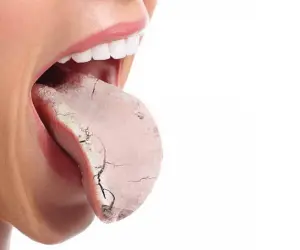Author: Lizzie Smith – blog last updated on Monday 17 February 2026
A dry mouth is annoying during the day, especially at night. If your mouth is already dry during the day due to medication or menopause, for example, it will only worsen at night.
In this article, we look at dry mouth complaints at night and morning… and what you can do about them.

Dry mouth at night
If you suffer from dry mouth complaints (xerostomia), this is particularly annoying at night. During your sleep (even without dry mouth complaints), the brain gives fewer signals to the salivary glands to get to work. During the day, you can drink water, eat a piece of fruit or chew gum. But when you’re asleep, that’s not possible. This can make you sleep worse because you regularly wake up feeling thirsty.
In addition, if you sleep with your mouth open, your oral mucous membranes and tongue dry out even further. This is due to the incoming and outgoing airflow.
Waking up with a dry mouth
If you’re lucky enough to sleep through the night, what about the moment you wake up? If you wake up in the morning with a dry mouth, this indicates you lack saliva (at least during the night). Too little saliva quickly leads to bad morning breath, but other mouth and dental problems may also lurk.

Pay attention to dry mouth complaints
If you’re lucky enough to sleep through the night, what about the moment you wake up? If you wake up in the morning with a dry mouth, this indicates you lack saliva (at least during the night). Too little saliva quickly leads to bad morning breath, but other mouth and dental problems may also lurk.
Bad breath
Increased plaque and tartar
Gingivitis
Fungal infection (candida albicans)
Tonsil stones
Sufficient saliva is the mouth’s natural protection against harmful oral bacteria as it’s rich in oxygen. Harmful bacteria can’t live in an oxygen-poor environment as they’re anaerobic.
In addition, saliva keeps the acidity in the oral cavity in balance. This is important because with lower acidity, minerals from food are better absorbed into the tooth enamel. This remineralisation is necessary to restore the enamel in places where it has worn off or been damaged.

For example, a shortage of saliva increases the risk of problems in the mouth and teeth in several ways, so it’s essential to determine the cause of your dry mouth and take measures if necessary. However, even if the cause can’t be removed, limiting the damage to your teeth is still a good idea.
Read more about the causes of a dry mouth here.
How to remedy dry mouth at night and in the morning
First of all, there are some basic measures you should take to combat dry mouth complaints and protect your teeth:
1. Use mouth-friendly toothpaste and mouthwash
Not all oral care products ensure well-hydrated oral mucosa. Alcohol, menthol and SLS (sodium lauryl sulphate), in particular, irritate the mucous membranes, which you don’t want if you suffer from dry mouth. Therefore, choose care products that contain mouth-friendly ingredients that soften the mucous membranes and stimulate saliva production.
Examples include toothpaste and mouthwash from RyttPro, Oralieve, JuliBrite, Dr Brite and UK Organics.

2. Breathe through your nose
If you have a cold, a sinus infection, the flu or an allergy, the nasal passage can become blocked, meaning you’re forced to breathe through your mouth. But this can also become a habit. Is your nasal cavity clear, but do you still breathe through your mouth when you sleep? If so, your mouth will dry out faster than if you slept with it closed.
The TonsilFresh Dry Mouth Strap offers a solution. This adjustable chin strap keeps your mouth closed at night, allowing continuous airflow and preventing your mouth from drying out.

3. Use a gel to prevent mouth dryness
While you can easily drink water, spray or chew gum during the day, a good mouth gel is more convenient at night.
Oralieve, a line specially developed for dry mouth complaints, has a good mouth gel based on natural enzymes. Spread the gel over your teeth, tongue and the inside of your cheeks before going to sleep. The mucous membranes remain moist and supple for longer, making you less likely to wake up with a dry mouth and feeling thirsty.
This gel also ensures your breath is fresher when you wake up.

Finally
You may suffer from a dry mouth at night and first thing in the morning but also during the day.
Read here about the resources you can use during the day.
Is the cause of your dry mouth complaints impossible to determine? You should visit your doctor if you can’t resolve your dry mouth with mouth-friendly oral care products and the additional remedies mentioned above. Dry mouth complaints can be a symptom of a disease.
